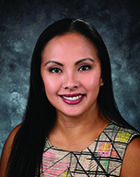 “Even if you’re feeling well and have no complaints or symptoms, it’s important to have your annual mammogram screening,” says Mary Grace Bridges, MD, a breast surgeon with Texas Tech University Health Sciences Center. Dr. Bridges provides specialized care for cancer, benign masses and other conditions of the breast. She emphasizes that screening is important to detect cancer earlier, when it is more treatable.
“Even if you’re feeling well and have no complaints or symptoms, it’s important to have your annual mammogram screening,” says Mary Grace Bridges, MD, a breast surgeon with Texas Tech University Health Sciences Center. Dr. Bridges provides specialized care for cancer, benign masses and other conditions of the breast. She emphasizes that screening is important to detect cancer earlier, when it is more treatable.
Q: When should I start regular mammograms?
Annual screening mammograms should start at age 40, and sooner for women at higher risk, including certain women with a family history of breast cancer. A number of factors are considered with regard to heredity. For example, was it a first-degree relative (e.g., mother, sister) who had cancer, and how old was she when diagnosed? Talk with your doctor about what constitutes high risk and whether you may be a candidate for genetic testing.
Q: I have “dense breasts.” What does this mean?
Dense breasts appear whiter on a mammogram test than fatty breasts, and cancer usually appears white. This can make it harder to see any type of abnormality. 3D mammography can help because it takes multiple thin slices, which makes images easier to read. If there are concerns, additional testing, such as an ultrasound, can be provided. Generally, as women get older, their breast tissue becomes more fatty.
Q: What are “3D” mammograms, and are they better?
Both two-dimensional and three-dimensional (3D) mammograms use X-rays to provide detailed images of the breast. 3D tests provide multiple images from different angles, and are better able to detect abnormalities. Another advantage of 3D is a lower rate of “call backs.” This can reduce the anxiety of having to return for additional testing.
Q: How else can I protect myself?
Along with regular mammograms, you should have “breast awareness.” In other words, be familiar with your breasts, and if you notice a lump, skin changes, nipple discharge or something abnormal, tell your doctor. Also, it’s important to have a clinical breast exam with a doctor at least every year, even before the age of 40.

